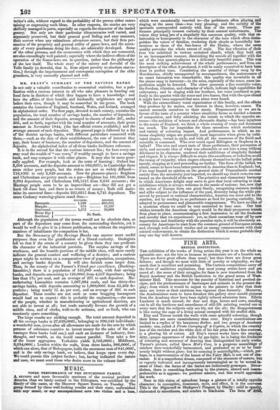Margate Gravesend . Herne Bay J Southend
Although the population of the towns would not be absolute data, as part of the depositors may come from the surrounding districts, yet it would be well to give it in a future publication, as without the respective numbers of inhabitants the comparison is lax.
But the Summary of the Savings Banks can answer more useful purposes than even the gratification of a liberal curiosity. Geologists tell us that if the strata of a country be given them they can predicate the character of the industrial pursuits. The surplus savings of the workmen, and the humble portions of the middle class, will more surely indicate the general comfort and wellbeing of a district; and a curious paper might be written on a comparative view of population, occupations, and savings banks deposits. It will also furnish some larger data. Thus, in the county of the Farmer's Friend par excellence, (Bucking- hamshire,) there is a population of 155,989 souls, with four savings banks, and deposits amounting to 128,0001. from 4,657 depositors; being less than 17s. per soul, and an average of 27/. to each depositor. Ma- nufacturing Lancashire contains 1,667,064 souls, and has thirty-five savings banks, with deposits amounting to 1,980,0001. from 65,402 de- positors ; being nearly 1/. 4s. per soul, and an average of 301. to each depositor. These results are not such as some bragging haranguers would lead us to expect: this is probably the explanation,—the mass of the people, whether in manufacturing or agricultural districts, are not able to invest at all; but trade naturally favours the growth of a middle class, and of clerks, well-to-do artisans, and so forth, who can constantly spare something. The large results are striking enough. The total amount deposited in all the savings banks is 27,639,0001., belonging to 990,543 individuals: a wonderful sum, (even after all allowances are made for the arts by which persons of substance contrive to invest money for the sake of the ad- vantages these banks hold out,) and such an instance of industry, fore- thought, and wealth, as the world cannot parallel. Then take a few of the lesser aggregates. Yorkshire yields 2,105,0006.; Middlesex, 3,534,0001. ; London within the walls, from three banks, 986,0001., of which one alone, that of Bishopsgate, holds the enormous sum of 841,0001., and is the only savings bank, we believe, that keeps open every day. We could pursue this subject further; bat, having indicated the nature and uses, we must send those who desire more to the volume itself.
MB. PRATT'S SUMMARY OF THE SAVINGS BANKS IS not only a valuable contribution to economical statistics, but a pub- lication with a curious interest to all who take pleasure in hunting out local facts in districts of which they happen to have a knowledge : and here the affairs of their humble and husbandly neighbours are spread before their eyes, though it may be somewhat in the gross. The book contains the counties of England, Scotland, Wales, and Ireland, arranged in alphabetical order. The first page, devoted to each county, contains the population, the total number of savings banks, the number of depositors, and the amount of their deposits, arranged in classes of under 201., under 501., and so forth, together with the total number of accounts, their gross amount in November 1844, (the last official return available,) and the average amount of each depositor. This general page is followed by a list of the district savings banks, with different particulars connected with them,—such as the date of their establishment, the rate of interest they pay, their hours of business, the number of depositors, and the amount of deposits. An alphabetical index of all these banks facilitates reference.
It is in the second list that the curious interest lies ; for here every one may read the wealth of "our town," if wealthy enough to have a savings bank, and may compare it with other places. It may also be more gene- rally applied. For example, look at the seats of learning : Oxford has 6,508 accounts, and the deposits amount to 160,9971.; in Cambridge there seem richer poor people, but the riches are not so widely diffused- 116,830/. to only 2,829 accounts. Now for pleasure-places : Brighton and Cheltenham are pretty much on a par—Brighton has 101,890/. from 3,994 depositors, and Cheltenham 106,1511. from 3,835 accounts ; the Hastings people seem to be an improvident set—they did not get a bank till June last, and there is no return of money; Bath still main- tains its ancestral fame—deposits 225,0211. from 6,741 depositors. The more Cockney watering-places stand thus—
Accounts. Amount.
Ramsgate 1,238 X.45,811 575 11,257 1,572 34,800 No Bank.


























 Previous page
Previous page